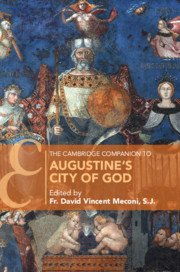Book contents
- The Cambridge Companion to Augustine’s City of God
- Cambridge Companions to Religion
- The Cambridge Companion to Augustine’s City of God
- Copyright page
- Dedication
- Contents
- Notes on Contributors
- Preface
- Abbreviations: Works by Augustine
- 1 Introduction
- 2 Book 1
- 3 Book 2
- 4 Book 3
- 5 Books 4 & 5
- 6 Books 6 & 7
- 7 Books 8–10
- 8 Books 11 & 12
- 9 Books 13 & 14
- 10 Books 15 & 16
- 11 Books 17 & 18
- 12 Book 19
- 13 Book 20
- 14 Books 21 & 22
- 15 Epilogue
- References
- Index
- References
7 - Books 8–10
Augustine and Platonism
Published online by Cambridge University Press: 21 August 2021
- The Cambridge Companion to Augustine’s City of God
- Cambridge Companions to Religion
- The Cambridge Companion to Augustine’s City of God
- Copyright page
- Dedication
- Contents
- Notes on Contributors
- Preface
- Abbreviations: Works by Augustine
- 1 Introduction
- 2 Book 1
- 3 Book 2
- 4 Book 3
- 5 Books 4 & 5
- 6 Books 6 & 7
- 7 Books 8–10
- 8 Books 11 & 12
- 9 Books 13 & 14
- 10 Books 15 & 16
- 11 Books 17 & 18
- 12 Book 19
- 13 Book 20
- 14 Books 21 & 22
- 15 Epilogue
- References
- Index
- References
Summary
Books 8–10 of The City of God complete the polemical interrogation of pagan culture. As Augustine says, the last five of these ten are addressed to the philosophers whose connivance with the blasphemies of the civic cult exposes the insufficiency of reason as a means to the knowledge of God and the perfection of moral character. In the three books discussed here, his interlocutors are the Platonists Apuleius and Porphyry, one the foremost African man of letters before Augustine himself, the other a trenchant critic of the scriptures who had derided Christianity as the superstitious worship of a dead man. Augustine’s case against both is that, notwithstanding their adherence to a school which had come close to Christianity in its consciousness of the unity and sovereignty of God, they had returned to the most demotic form of polytheism, making human access to the gods depend on a race of aerial spirits who are inferior in piety and benevolence to the best denizens of earth. Augustine’s aim is to show that their speculations are inconsistent not only with scriptural teaching on the origin of demons, but with the genuine traditions of Platonism, the confession of the ancient prophet Hermes Trismegistus and Porphyry’s own intimations of the true nature of God.
- Type
- Chapter
- Information
- The Cambridge Companion to Augustine's City of God , pp. 122 - 144Publisher: Cambridge University PressPrint publication year: 2021



